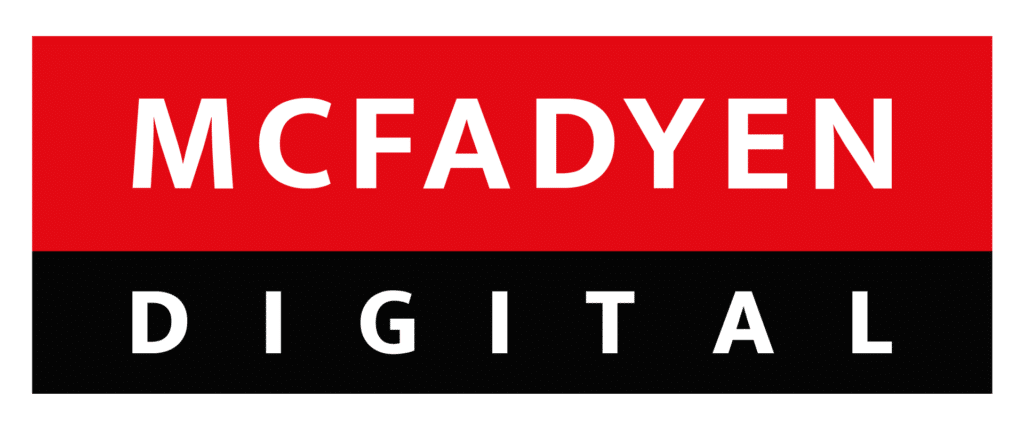

OCC-related demos showing integrations with Mirakl Marketplaces and Oracle CPQ Cloud were hot topics at the McFadyen booth, along with talk of breaking down data silos, and focusing holistically on the customer experience.
“Be Remarkable”
This was the challenge issued by customer experience expert Jay Baer in opening Oracle’s Modern CX 2018 show. Actually being remarkable, of course, is much easier to say than to do as we navigate through the reality of our organization’s often competing priorities for budget, project time, and mindshare. He continued, “When you can deliver legendary experiences, you become a hero inside your organization and to your customers.” Being CX heroes is what this show is all about, so it’s up to all of us to get the job done. And, really…what Superhero doesn’t go through adversity?
As both Ecommerce and Marketing practitioners, our firm sees the daily battles organizations of all sizes fight while figuring out how to offer a remarkable, Amazon-like, experience to their customers, with increasingly blurry lines separating B2C and B2B experiential expectations. The key, the secret sauce that makes the remarkable posible, is in the data. Now, data isn’t sexy to most people. It isn’t flashy and pretty and the thing that makes the public take notice in the way that stellar UI design or grand in-store display will. Yet data is what can tell us the things our customers won’t about what they are seeking or not seeking, about what can make the difference between making a sale or having a customer bounce over to Amazon.
Through the course of the Modern CX show, the McFadyen team was busy. As a proud Silver Sponsor, we exhibited with demos of Mirakl Marketplace + OCC or ATG, as-well-as OCC + Oracle CPQ Cloud, we presented a Theater Session on the benefits of adding an online marketplace to OCC, a Breakout Session telling the story of how we helped Alpha Industries replatform to OCC in just 4 months, hosted a private event at The Signature Room on the 95th with CPQ partner AccelAlpha, and, – of course – attended our share of sessions. Here are our thoughts and takeaways regarding the creation of a remarkable Ecommerce customer experience:

McFadyen Digital President Tom McFadyen steps his audience through the integrated OCC architecture behind Alpha Industries excellent customer experience. Data silos, be gone!
Data is King in Digital Transformation
“Data is our first and most basic strategy… We’re going to be living and breathing data because it’s the basis of modern marketing”, commented Shashi Seth, SVP of the Oracle Marketing Cloud. While it is true that data is the basis for effective modern marketing, it is also the key to delivering an increasingly individualized online shopping experience. All of the proper messaging in the world won’t matter if a user’s on-site experience doesn’t match the precision of the marketing messaging.
This brings us to the convergence of the greater Customer Experience, the whole-cycle fusion between marketing, on-site commerce experience, sales, and service considerations. We hear the term “Digital Transformation” frequently, but true transformation doesn’t happen without a top-down commitment to breaking down data silos, breaking down individual fiefdoms, and treating both the data analysis and the strategic planning of the end-to-end customer experience as one holistic effort. Too often, modern organizations committing to digital are still focusing individual functional areas on each stage in a buyer’s journey. While having such a playbook is certainly not a bad thing, that playbook needs to be planned and produced with aligned representation from marketing, commerce ops, sales, and service across all stages, in order to ensure that data is being used in a consistent manner throughout. Owning each customer moment requires a consistent, aligned approach between all of these groups.
At the Modern CX show, Fabricio Lopez, Senior Principal Consultant for Expert Services at Oracle Marketing Cloud, reinforced the importance of a data strategy by saying, “A well-documented data maintenance strategy will ensure that you will always have the most accurate and clean data, giving you a solid foundation for optimized marketing performance.” Sub in “commerce and marketing” and this applies perfectly for Ecommerce operators as well.
We’re seeing Oracle’s commitment to Data with the evolution of their Data Cloud, which breaks down consumer data silo barriers, allowing retailers to provide personalized Ecommerce and messaging experiences, even to anonymous audiences. An exciting development for marketers is the release of Oracle Infinity, a data analytics platform under the Oracle Marketing Cloud (OMC) suite. It’s a very open analytics platform with the advantage of being able to process massive amounts of data in real-time. This is an exciting offering that, due to its open nature, should have broad appeal, even in MarTech stacks that may not yet include any OMC components.
How Ecommerce Operators Make Data Actionable
The digital fingerprints left by our prospects and customers is plentiful and only getting more nuanced. We can measure email engagement, on-site activities, re-targeting efforts, purchases, abandoned carts, etc. But how can Ecommerce operators use this data to provide that remarkable customer experience?
1) Move Critical Platforms to the Cloud
Look, there are some incredible premise-based platforms still providing daily value to companies worldwide, but those systems are aging and there’s good reason their creators are replacing them with cloud-based solutions. Most premise-based platforms aren’t very open, they are a pain to integrate with, and they represent the old – costly – way of doing things. There’s nothing wrong with hanging on for a bit to a highly customized instance of Oracle Commerce(ATG), for example, but it’s not going to provide nearly as much long-term flexibility and value as Oracle Commerce Cloud. The same logic applies to platforms like CRM, Customer Service, and Marketing/Digital Engagement. Cloud platforms are purpose-built to enable data portability and easy integrations. That, combined with the frequent feature updates and security that comes with a SaaS offering, are compelling reasons to move to the cloud. You free up your data, break down silos, foster alignment between functional areas, and ultimately end up providing a superior consumer experience.Remarkable, indeed.
2) Expand Product and Category Offerings by Creating an Online Marketplace
A NULL search is a death-knell in modern Ecommerce. If a customer can’t quickly find something on your site, they are only a couple clicks away from finding that item on Amazon, or Walmart, or Ebay, or any number of Ecommerce properties employing a 3rd-party-seller marketplace model. Starting with a report of NULL search results on your own site can point to immediate opportunities for product and category expansion within your own site. By incorporating an online marketplace model, you can quickly ramp up and expanded product and category assortment without the risk of carrying additional inventory or expanding a pricey pick-and-pack operation.From a data perspective, marketplaces are essentially free consumer research for the site operator, who then has unlimited access to consumer data around the 3rd party services and categories. Such intelligence can help organizations expand their own core inventory, risk-free, since the need, volume, and margins are already being realized.
Remarkable data for the site operator and product selection for the customer. A true win-win.
3) Employ Unified Dynamic Segmentation
This one seems obvious, yet a surprising number of Ecommerce organizations either do not employ dynamic segmentation of their customers or employ it in a vacuum. Dynamic segmentation starts at a high-level with identifying various types of customers into primary groups – the highest level of segmentation useful to your business. This may be as simple as identifying the major groups along gender lines, age ranges, or interest areas based on known data, but can also involve behavior based segmentation, cueing off of what pages customers view, what articles or social posts they engage with, etc. Iterate from there to deepen the segments. The more relevant segments, the more personalized experience you can offer.The “unified” part of this concept is that these segments can be used by any department or technology that touches the customer in any stage of their journey. This ensures not only a consistent experience, but that buyers will be engaged with messaging that speaks to their interests with every brand interaction. The classic ideal of giving the right message to the right person at the right time. From an on-site perspective, this means providing more relevant product suggestions in searches, in related items areas, and in cross and up-sell opportunities. Ensure that all groups involved in providing your customer experience are using the same segmentation groups to engender a consistent brand experience across channels.
Customers find relevance and consistency to be pretty remarkable things.
4) Use Analytics-based Offers
Creating an offer strategy using data instead of the legacy method of seasonal considerations or gut-feel is another way Ecommerce operators are using data for a combination of marketing, 0n-site, and service success. Analyzing customer purchase patterns against items viewed and items abandoned in their carts can provide amazing levels of insight into either additional or complimentary purchases that were considered, but never occurred. Targeting offers based on these considered-but-not-executed-upon purchases can get prospective customers over the hump and can re-engage existing customers into making additional purchases. AI and machine-learning are increasingly being applied to the dynamic offer formulation by top retailers and will continue to mature in both sophistication and accuracy.Relevant offers that convert are pretty remarkable for both the customer and site operator.

McFadyen Digital CTO Lorcan McGann presents about integrating Oracle Commerce Cloud with a Mirakl Marketplace
What’s Next?
As we all take the lessons learned and knowledge gained at Modern CX back to our organizations, the impetus on each of us is to carry forward our commitments to providing a superior customer experience. As the old saying goes, a rising tide raises all boats, so too does competition, sharing best practices, and relentlessly pursuing the goal of providing an individualized experience to each customer.
Be remarkable? Challenge accepted!
If you have a need for Ecommerce, Marketplace, or Marketing services, please reach out to us at engage@mcfadyen.com or hit us up on Twitter @McFadyen.
[Author’s Note] A personal thank you to Diane Frendian, Travis O’Hara and the entire Modern CX staff. This was an extraordinarily well-run show and you made it easy to be a sponsor. Congratulations on an event well done.
AUTHOR
Thomas Gaydos
CMO & Digital Marketing Practice Lead
McFadyen Digital
@ThomasGaydos
Related Articles
Turn Insight Into Impact.
Start Today.




